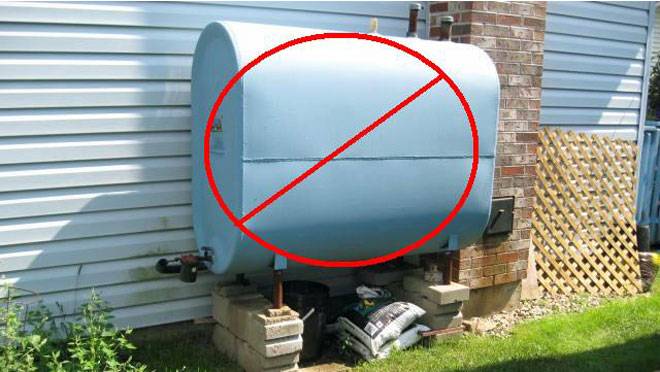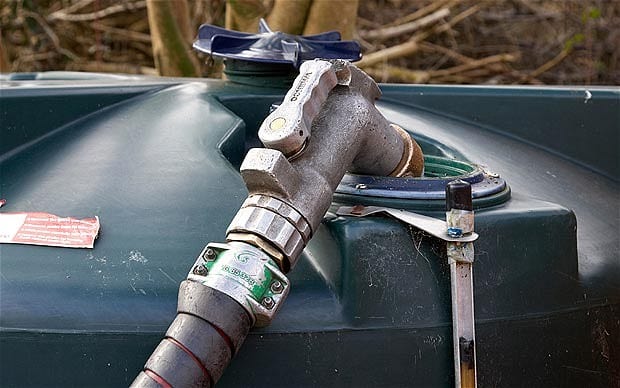Protect your oil tank
Oil protection is extremely important and with the following crime prevention advice offered by Norfolk Police:
- · Position your oil tank to allow maximum view from your property – this may discourage passing thieves.
- · Use good quality padlocks, close shackle are often best, to secure your tank.
- · Use security lights to make the property a less attractive target for thieves.
- · Defensive planting helps reduce crime – thieves don’t want to force their way through or over a prickly hedge.
- · Additional security; a wooden or metal fence, trellis or wall can all offer additional protection, although the tank must be accessible for the oil tanker driver.
Position of your tank
The position of the tank can have a significant effect on how hard a target it is in the eyes of the thief. If the tank is close to the house, with one or more windows capable of giving a view of it, then the thief may consider the chances of being seen too high. If the tank is close to a road, path, drive or alleyway then it will be a far easier target. Hiding the tank behind the garage, shed or some other type of outbuilding is fairly commonplace, but it does give the thief the advantage.Not many oil tanks are works of art so who wants a tank in full view? While it may not be desirable, or legal, to have the tank close to the house some sort of compromise location would be sensible.
Of course this will not only be a major consideration when a new tank is to be installed but may be necessary if the tank has been targeted before! They do need to be within a reasonable distance of the road otherwise the oil supply company may not Not many oil tanks are works of art so who wants a tank in full view? While it may not be desirable, or legal, to have the tank close to the house some sort of compromise location would be sensible. Of course this will not only be a major consideration when a new tank is to be installed but may be necessary if the tank has been targeted before! They do need to be within a reasonable distance of the road otherwise the oil supply company may not be able to refill it for you!
Lock it up
A good thief will come equipped with a limited range of tools to attack your tank so its worth spending a little more on good quality locks. Close shackle padlocks are the best as they offer most resistance to the most popular of burglar tools – the bolt cropper! Due to their design, close shackle padlocks have very little of the metal hoop (shackle) exposed and bolt croppers cannot get a good grip. Remember that buying a padlock is like buying a car the more you pay the better the quality you get and the longer it will last.
Lights it up
Security lights can have a very positive effect and make any property a much harder target for the thief. Its not always necessary to floodlight the area with high power beams, as a more subtle level of lighting may be all that is needed. Low energy “dusk til’ dawn lights positioned close to the tank should, in most cases, provide sufficient light to illuminate any suspicious activity. This type of light can be both effective and inexpensive. High powered lights can be used but care should be taken not to cause any nuisance to neighbours or road users.
Defensive Planting
This is natures way of helping to reduce crime. Thieves will not wish to force their way through or over a prickly hedge. The smallest trace of blood or shred of ripped clothing could help the police identify the offender. These shrubs can, if planted around your tank, provide an effective and decorative thief proof barrier.
Fence it in
Following on from the defensive planting tactic, fences and walls can also make life difficult for the thief. A wooden or metal fence, trellis or wall can give significant protection to the tank but it must be remembered that the oil tanker driver will need access to fill the tank! A metal grill or cage with a lockable access point across the top of this wall or fence can further improve security.
Big Brother
The use of CCTV as a crime prevention and a crime detection tool has grown massively in recent years. It could play a part in the protection of oil tanks but before you spend lots of money on equipment make an assessment of your needs. Ask yourself:
- · What do I hope to achieve by using CCTV
- · How much do i want to spend
- · Is there a reasonable level of light where the cameras will be operating or do I need to think about using cameras with low light capability? most thefts take place at night.
- · What am I going to record the captured images on – digital recording is best?
- · How am I going to provide the police with any evidence I may capture?
Conclusion
The information above is to highlight ways in which we can make it more difficult for a thief to steal heating oil and fuel. Nothing mentioned here will make it impossible for them achieve their goal but if some of the suggestions made are followed it just may make a difference.







